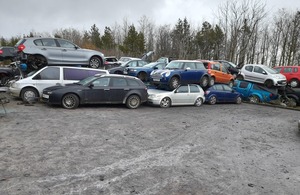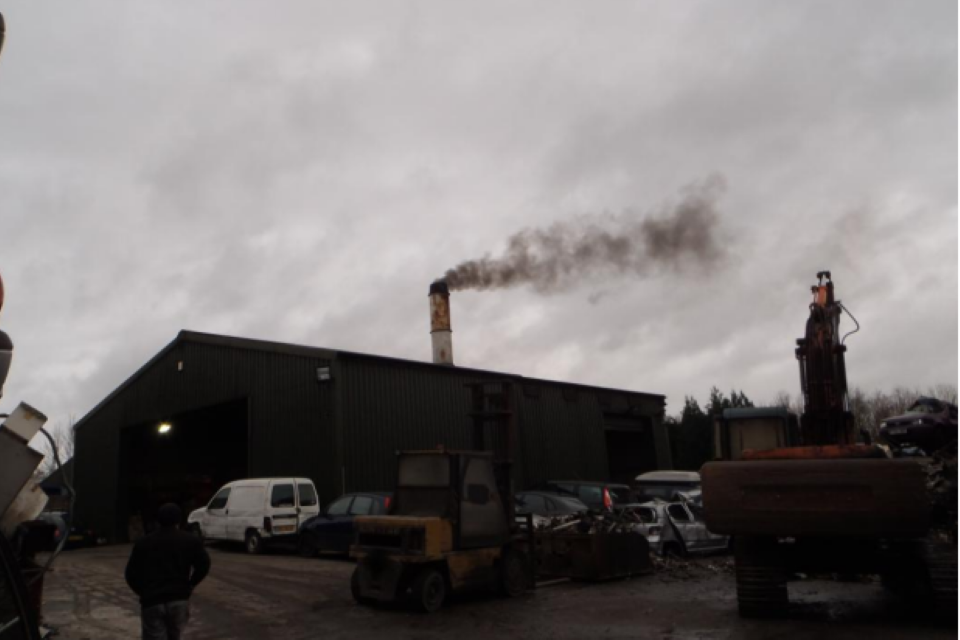Cornwall scrapyard doctored documents over smelting emissions
Graham Orchard unlawfully smelted aluminium for years in breach of the environmental permit.

Burnt House Garage in Liskeard processed end-of-life vehicles but reports on emissions from the smelting process and disposal of vehicle fluids were falsified
A Cornish scrapyard owner has been given a suspended sentence and ordered to repay £201,743 by the Environment Agency for smelting aluminium in breach of the environmental permit at his premises for years.
Graham Orchard, who owns Burnt House Garage at Dobwalls, Liskeard, Cornwall pleaded guilty to six offences at Truro Crown Court on 14 November 2025. Orchard was ordered to repay £1,271,034 under the Proceeds of Crime Act of which he must pay £201,743 within three months, by the 13 February 2026, or the default is 18 months in prison. He was sentenced to 10 months in prison suspended for 2 years on each count.
Should Orchard come into additional funds in the future, the Environment Agency would be able to pursue the remainder of the order if felt appropriate.
Strict rules over smelting, emissions and fluid disposal
The court heard that Burnt House Garage is an Environment Agency permitted end-of-life-vehicle processing facility that includes an aluminium smelting facility. Although the garage has been in the Orchard family for many years, Graham Orchard has been the main operator since 2013, and the operating permit was formally transferred to his name in 2017.
The permit for the site allows up to 5,000 tonnes of waste vehicles and metals to be accepted for the purposes of dismantling and recovery. It also allows the site to separate aluminium from mixed vehicle metal scrap by differential melting in the furnace.
Aluminium melts at a lower temperature relative to other metals found in vehicles. The resulting aluminium ingots are then sold on. The permit specifies conditions that the site operator must comply with to ensure that the site does not cause harm to human health or damage to the environment.

Dark smoke emissions from the stack
One of the conditions for the garage includes submission of annual emission monitoring results to the Environment Agency. Another requires all vehicle engines to be depolluted and for the furnace to only be fuelled by diesel containing less than 0.1% sulphur. It does not allow the use of waste engine, gear box or hydraulic oils to be used as a fuel as the levels of sulphur in waste engine oil would considerably exceed the above limit.
The monitoring results were submitted annually by Orchard and appeared to indicate that the smelter was operating within the permitted emission limits. When the aluminium smelting facility was first installed, a company was employed to test that it had been properly commissioned.
Doctored report sent to regulator
The report of this test, submitted to the Environment Agency, showed that the smelter complied. However, the agency later discovered that this commissioning testing found that the smelter failed its emission limits.
In the conclusion section of his report, the sole director of the testing company made recommendations to improve the furnace’s performance. The version of the report that was provided to the Environment Agency did not contain this conclusion section and the test results table had been altered. All the failed results had been replaced with pass results.
In subsequent years this falsified report was further amended and submitted to the Environment Agency to indicate that the furnace continued to operate in compliance with the permit.
Further false report over waste fluid disposal
The director of the testing company confirmed in a witness statement that he only ever attended Orchard’s premises once, and although he expected to be asked back to retest following improvements, he was never contacted again by Orchard.
Following a routine inspection and the checking of Environment Agency databases, it was found that no hazardous waste liquids were consigned from the garage between 2017 and 2021.
The regulatory officer requested information on the disposal of waste liquids produced from depolluting vehicles. Orchard provided to her a consignment note in 2022, which was false.
It was calculated that a site such as the garage would have been expected to produce something in the region of 14,100 tonnes of waste engine oil and 1,250 tonnes of waste brake fluid between 2017 and 2022.
‘Flouting regulations undermines legit operators’
An Environment Agency spokesperson said:
Orchard deliberately falsified reports in order to mislead us into believing the smelter was being properly managed and was operating properly. Sadly, that certainly was not the case.
The use of waste oils to fuel the smelter, the inability to properly control the temperature of the furnace and the smelting of engines containing waste oils would have caused the emission of harmful substances from the flue for years.
I hope today’s prosecution sends out a clear message that we are cracking down on offenders who deliberately flout the regulations and undermine legitimate waste operators.
Background
Graham Orchard pleaded guilty to the following offences, other offences were not pursued.
-
Between the 1st December 2013 and the 31st December 2016, operating a regulated facility otherwise than under or in accordance with an environmental permit, by failing to monitor the emissions from the aluminium smelting furnace, contrary to regulations 38(1) and 12(1)(a) of the Environmental Permitting (England and Wales) Regulations 2010 (Count 5)
-
Between the 1st January 2017 and the 30th July 2022, operating a regulated facility otherwise than under or in accordance with an environmental permit, by failing to monitor the emissions from the aluminium smelting furnace, contrary to regulations 38(1) and 12(1)(a) of the Environmental Permitting (England and Wales) Regulations 2016 (Count 6)
-
Between the 1st December 2013 and the 31st December 2016, using documents required under an environmental permit with intent to deceive, by tendering false annual emissions reports for the aluminium smelting furnace, contrary to regulation 38(4)(d)(i) of the Environmental Permitting (England and Wales) Regulations 2010 (Count 11)
4. Between the 1st January 2017 and the 30th July 2022, operating a regulated facility otherwise than under or in accordance with an environmental permit, by tendering false annual emissions reports for the aluminium smelting furnace, contrary to regulation 38(4)(d)(i) of the Environmental Permitting (England and Wales) Regulations 2016 (Count 12)
5. Between the 1st December 2013 and the 30th July 2022, disposing of controlled waste in a manner likely to cause pollution to the environment or harm to human health, by burning waste engine oil in an aluminium smelting furnace, contrary to section 33(1)(c) and 33(6) of the Environmental Protection Act 1990 (Count 13)
6. Between the 1st January and the 28th January 2021, intentionally making a false entry in a record, by tendering a signed hazardous waste consignment note which falsely asserted that waste oils had been exported from the site, contrary to regulation 68(2) of the Hazardous Waste (England and Wales) Regulations 2005 (Count 14)